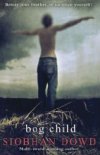Review:

 David Fickling Books, 2008.
David Fickling Books, 2008.
(Ages: 12+) Fergus is 17, in the middle of A-Levels and with his heart set on a place at Aberdeen University to study medicine. The only problem is that real life keeps getting in the way - namely his brother Joey's prison sentence at The Maze for his involvement with the IRA. Joey's decision to embark on a hunger strike in support of Bobby Sands and other 'prisoners of conscience' has a huge impact on Fergus and his family. Set in the Irish border town of Drumleash, Bog Child is the story of Fergus' incredible discovery, his first love affair and his desperate attempt to save his brother from starvation.
At first I was unsure how the discovery of a 2000 year old body, protected by the peat marsh, would link with an account of IRA activity and the troubles, but Dowd effortlessly weaves Fergus's incredible find with his anguish and fear for his brother. In an attempt to persuade the IRA to call off the hunger strike Fergus agrees to work for them, transferring small, anonymous packages across the border. As a keen mountain runner he can do this easily. During his fell runs Fergus meets Owain, the young Welsh soldier manning one of the border crossings, and the two form an uneasy friendship. Indeed both Owain and Fergus are called in to help move the Celtic body discovered in the peat.
Fergus christens the young girl he finds Mel and the gradual uncovering of her tragic story connects the reader to Joey's situation. I felt a little uneasy that Dowd was drawing parallels with Mel's plight to that of Bobby Sands and other hunger strikers. Memories of the Enniskillen, Omagh and Warrington bombings will still be raw for many people, but that is perhaps the greatest strength of Dowd's novel. She reminds us of the human cost of intense belief - people willing to die of starvation for a cause, and their mothers, fathers and brothers who have to suffer the anguish and bitterness that this involves.
There are flashes of humour. Fergus's discovery of the content of the packages he has been transporting for the IRA must be one of the most unexpected and funniest I've read in a long time.
As we have come to expect from Dowd this is a brilliant story, emotional but sparing, humorous yet brimming with anguish. However, I do wonder how today's teenagers will view a novel set during a period of history they will probably know little about. Will they truly understand the strength of feeling the Maze prisoners experienced? Perhaps thanks to the energy and power of Dowd's writing they will. This is a fascinating story with characters that leap off the page. Try it with your keen, sensitive readers. They are certainly in for a treat.
Claire Larson
Home
Bog Child by Siobhan Dowd

 David Fickling Books, 2008.
David Fickling Books, 2008. (Ages: 12+) Fergus is 17, in the middle of A-Levels and with his heart set on a place at Aberdeen University to study medicine. The only problem is that real life keeps getting in the way - namely his brother Joey's prison sentence at The Maze for his involvement with the IRA. Joey's decision to embark on a hunger strike in support of Bobby Sands and other 'prisoners of conscience' has a huge impact on Fergus and his family. Set in the Irish border town of Drumleash, Bog Child is the story of Fergus' incredible discovery, his first love affair and his desperate attempt to save his brother from starvation.
At first I was unsure how the discovery of a 2000 year old body, protected by the peat marsh, would link with an account of IRA activity and the troubles, but Dowd effortlessly weaves Fergus's incredible find with his anguish and fear for his brother. In an attempt to persuade the IRA to call off the hunger strike Fergus agrees to work for them, transferring small, anonymous packages across the border. As a keen mountain runner he can do this easily. During his fell runs Fergus meets Owain, the young Welsh soldier manning one of the border crossings, and the two form an uneasy friendship. Indeed both Owain and Fergus are called in to help move the Celtic body discovered in the peat.
Fergus christens the young girl he finds Mel and the gradual uncovering of her tragic story connects the reader to Joey's situation. I felt a little uneasy that Dowd was drawing parallels with Mel's plight to that of Bobby Sands and other hunger strikers. Memories of the Enniskillen, Omagh and Warrington bombings will still be raw for many people, but that is perhaps the greatest strength of Dowd's novel. She reminds us of the human cost of intense belief - people willing to die of starvation for a cause, and their mothers, fathers and brothers who have to suffer the anguish and bitterness that this involves.
There are flashes of humour. Fergus's discovery of the content of the packages he has been transporting for the IRA must be one of the most unexpected and funniest I've read in a long time.
As we have come to expect from Dowd this is a brilliant story, emotional but sparing, humorous yet brimming with anguish. However, I do wonder how today's teenagers will view a novel set during a period of history they will probably know little about. Will they truly understand the strength of feeling the Maze prisoners experienced? Perhaps thanks to the energy and power of Dowd's writing they will. This is a fascinating story with characters that leap off the page. Try it with your keen, sensitive readers. They are certainly in for a treat.
Claire Larson
Home
© Pledger
Consulting, 2007